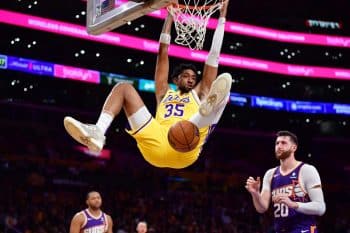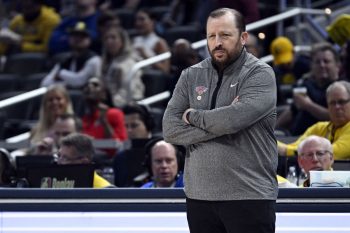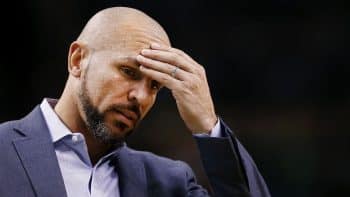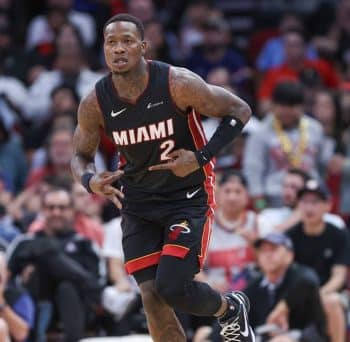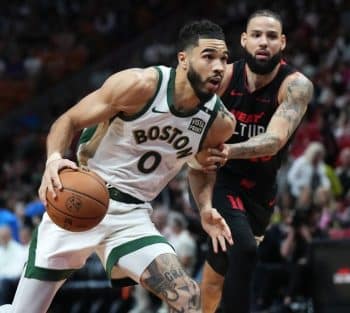NBA
NBA Sunday: Paul Pierce, Still the Truth

In familiar territory, he was awkwardly at peace and eerily comfortable, despite the pressure of the moment.
With a panicked convergence and pressure from the defense, he crashed with a soft thud and laid, for a split second. He looked up, watching as his fateful shot sailed, looking slightly long, before it caromed off of the glass and found the net as the horn sounded.
And in the moments immediately preceding the jubilant explosion, all 40,000 eyeballs in attendance were transfixed on the dramatic confrontation.
Despite crumbling to the hardwood, even in a low moment, Paul Pierce, the Washington Wizard, was at his highest point.
And in spite of his 37-year-old frame and deteriorating athleticism, Pierce still has the strength to carry these Wizards on his still far-from-feeble shoulders.
On May 9, he proved it yet again.
“These are the moments why you have a guy like him,” Wizards head coach Randy Wittman said.
Yes, these moments. They are what Pierce has lived for.
Over the course of his 17-year NBA career, it is not the attrition, caroms or crashes that have defined Pierce. Rather, it has been his defiance of attrition, the conversion of his caroms and more than all else, his ability to rise up and emerge victorious.
Now, we know, somehow, even when he is laying flat on his back, he is able to come out on top.
After all these years, Paul Pierce is still the Truth.
* * *
After making a home in Boston, Pierce went from being a lanky freshman to a franchise cornerstone. He survived Rick Pitino and Jim O’Brien and grew with Doc Rivers.
He outlasted Antoine Walker, Kenny Anderson, Sebastian Telfair, Al Jefferson and even Ray Allen. In the end, though, he couldn’t survive Danny Ainge.
Ainge put the team’s want to remain competitive in the short-term before the fact that, as Kobe Bryant came to be the Los Angeles Lakers and Tim Duncan came to be the San Antonio Spurs, Paul Pierce had become the Boston Celtics.
Those close to Pierce maintain that his separation from a city that he came to love over the course of his 15 years there left him heartbroken. And on the day he met with the assembled media in New York City as a member of the Brooklyn Nets, Pierce said exactly that, admitting that it was his wish to end his career in Boston.
Covering Pierce as a member of the Nets for one season, with a first-hand look, he never seemed to fit in. His body language and demeanor never suggested that he was happy and in a recent interview, Pierce provided some insight as to why that may have been.
Privately, those within the Nets organization were similarly sour on Pierce. He was a true professional, but concerns about his age and his ability to maintain his presence as a credible defender on the perimeter were duly noted. The team’s financial inefficiency had them questioning and reevaluating their return on investment and a new edict to develop the team’s younger talent had an impact. Ultimately, the Nets convinced themselves that they would be better off without Pierce—an assessment that looks ridiculous in hindsight, considering the Nets have been nothing more than overpaid underachievers.
It was Pierce, mind you, whose blocked shot sealed last season’s Game 7 victory for the Nets, giving the club its first (and only) playoff series win since 2007.
For Pierce, however, the franchise’s decision to not offer him a new contract was a blessing in disguise. It freed him from the impossible situation of having to choose between staying with Garnett or pursuing his own happiness elsewhere.
If nothing else, the Brooklyn experience made Pierce wiser and stronger. What it taught him more than anything else, though, is that what glitters isn’t necessarily gold.
On the day he met the media in New York for the first time, Pierce spoke of competing for championships in the twilight of his career. At that time, he never expected it to be 225 miles Southwest of Brooklyn’s Barclays Center.
* * *
It’s Christmas Day and John Wall is beside himself. As he bounces around the visitor’s locker room in Madison Square Garden, he attributes his excitement to the Wizards and their potential. Before tip-off, Pierce, after getting treatment, quietly sits in his locker stall and observes Wall, who is explaining what playing on Christmas Day means to him.
The Wizards began their season by winning 19 of their first 25 games but had lost two consecutive home games to the Phoenix Suns and the Chicago Bulls. Now, in New York City, in front of the entire country, the Wizards had an opportunity to get back on track.
After Wall begins speaking, Pierce enters and observes.
Not long ago, it was Pierce who was the primary media attraction, but today, on Christmas, he is background noise. Still, he’s okay with that.
By the time Allen and Garnett arrived in Boston, Pierce had long realized that the key to winning in the NBA—as evidenced by one of his contemporaries in Tim Duncan—was being bashful of the flashing lights. Long ago, he cast his ego aside and today, he found special pleasure in hearing Wall’s excitement about playing on Christmas—something Pierce had done more times than you’d want to count.
Eventually, Pierce and I have our moment. We converse briefly, recalling his season with the Nets. He extols the virtues of Wall and Bradley Beal and speaks of the necessity of having older players like him around. According to Pierce, young players with potential often have “no idea” of how good they can be. According to him, what they need more than anything else are veteran NBA players who they respect, pushing them, teaching them and sometimes, humbling them.
About a week has past since Rajon Rondo—the sole remnant of the 2008 Celtics team that Pierce led to the championship—was traded.
Our conversation turns to Rondo and Pierce explains the direction that Ainge is taking the Celtics before I asked him a direct question.
“Do you think the days of one player spending his entire career with one team are over?”
His demeanor changes immediately. He sighs loudly, looks down and then looks at me and answers, matter-of-factly.
“I think those days are definitely over,” he says, obviously saddened by the subject.
As Pierce reminds me that he needs more treatment and ends our conversation, I recall speaking with him on the day he was introduced as a member of the Nets. Even then, he cited his love for Boston, and in this brief encounter, I took his body language and abrupt termination as evidence that his heart was still mending over his breakup with Boston.
I walked away wondering if Pierce would make new memories.
* * *
After splitting the first two games with the Atlanta Hawks, Game 3 was nigh. In such a situation, the team that wins Game 3 wins the series 76 percent of the time. Playing without John Wall, the Wizards entered the contest knowing they would need great contributions across the board.
Prior to tip-off, Ramon Sessions got shots up, as did Marcin Gortat. Beal, an hour before tip-off, was working on pull-up jumpers—a shot that would be available to him as the team’s primary ball handler.
On the court and in the locker room, there is no sign of Pierce. The only evidence of his presence at this point was the sharp, checkered baby blue sports jacket that hung in his locker.
Prior to tip-off, he was a scarce sight, but in the end, he was exactly where the Wizards needed him to be.
Knocked down, counted out and thought to be outmatched by the number one seed in the Eastern Conference, the 37-year-old Pierce came to the rescue.
Jettisoned by Danny Ainge, dismissed by the Brooklyn Nets and seemingly forgotten by scores of NBA fans around the country, Pierce, with a heavy heart, began anew in Washington, D.C.
The arena had changed. The uniform and his sweat-soaked headband were both different colors. The teammates with whom he shared the field of battle were younger and the head coach that put fate in his hands was new.
Still, for Pierce, everything felt routine.
“I’ve been in that situation so many times,” Pierce said, now wearing the aforementioned sports jacket at the podium.
“I just got took my time, got to my spot and was able to knock it down.”
Occurring at the buzzer, the game winner was well-timed.
For the Hawks, it was a painful reminder.
For Randy Wittman, it was a validation of his trust in Pierce and for his young Wizards, it was an important lesson.
Above all else, though, it was ironic.
His highest moment came at his lowest point. With his arms raised triumphantly, even as Paul Pierce “lied” on his back, as he watched his game-winner bank in, after 17 years and with his team on his shoulders, he was still the Truth.
